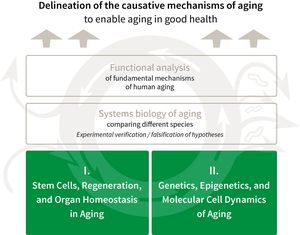Research For Better Aging
Our Research Concept
Aging is characterized by an accumulation of molecular damage, decreased stress responses, and a reduced stem cell function, regeneration and organ maintenance.
Multiple factors influence these processes including genetic, epigenetic, metabolic, and environmental factors.
Our interdisciplinary team of international biomedical researchers focuses on two interconnected program areas:
Organ maintenance (homeostasis) and regenerative capacity decrease during aging. This leads to impairments in organ function and to an increased risk of disease development. Adult stem cells are essential for the maintenance and regeneration of organs and tissue. However, the regenerative capacity of stem cells declines with age and stem cells accumulate mutations that clonally expand and pre-dispose to the development of diseases and cancer and an overall increase in mortality.
The FLI investigates the molecular causes for these aging-associated changes with the goal to uncover new approaches for therapies aiming to preserve the functioning of the body's own stem cells and organs thereby reducing the risk of diseases and cancer during aging.
A central phenomenon of cell and tissue aging is the accumulation of molecular damages. This is cause as well as consequence of the decreasing capacity of organisms to repair biological molecules and/or to renew faulty tissues and organs. The molecular factors that contribute to the age-dependent increase in damage accumulation are still incompletely understood.
Hence, the FLI focuses on the origin of the aging-induced increases in molecular damage aiming to elucidate how it contributes to impairments in stem cell function and the evolution of organ dysfunction and diseases in aging. Interspecies comparison and the introduction of specific genetic changes in short- and long-lived model organisms are used to delineate genetic factors influencing the aging process. Human genome analysis is used to delineate sequence variants and genes that determine the individual predispositions toward healthy aging or the development of age-related diseases in people.
Systems biology and bioinformatics analyses are employed to compare research results from model organisms with human aging to develop models and predictions for causative molecular mechanisms and circuits that influence human aging. These hypotheses will be tested in wet lab experiments to initiate a repetitive cycle resulting in improved identification of molecular mechanisms of human aging using mathematical analysis.
Our Research Aim
The research focus on these two program areas is unique at national and international level. The long term goal of our research is to delineate molecular mechanisms that are relevant for human aging and the development of aging induced dysfunction and diseases. To this end, functional genomic platforms and a number of model organisms spanning from invertebrates to genetic mouse and fish models were developed to better understand processes in humans. In cooperation with international, national and local cooperation partners, we aim to use our findings for the development of new therapies to preserve tissue maintenance and to reduce the risk of age-related diseases thus facilitating healthy aging.










